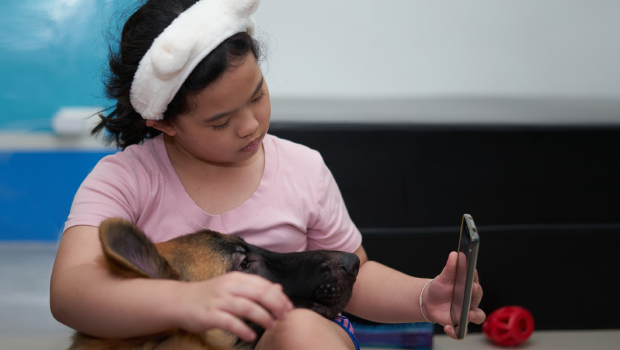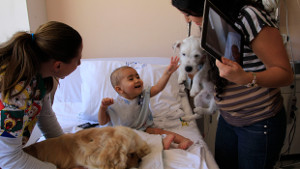How did the pandemic impact hospital visits with animals?

Top pediatric oncology hospitals reported lasting changes to programs involving visits with animals
During the COVID-19 pandemic, many activities pivoted from in person to virtual. Now a new study led by Kaiser Permanente Washington Health Research Institute (KPWHRI) Senior Investigator Jessica Chubak, PhD, and published in the Journal of Pediatric Health Care shows that visits with therapy animals in hospitals were no exception. Researchers spoke with 18 top pediatric oncology hospitals in the U.S. about their animal-assisted activities programs to understand the impacts of the pandemic, finding that most hospitals reported lasting changes in how visits were conducted.
What are animal-assisted activities?
Animal-assisted activities are common in pediatric hospitals. Usually they involve a visit with a volunteer and their registered pet, and patients can pet or play with the animal. Previous research shows that patients report less pain, greater comfort, and positive emotional effects after interacting with animals, and the programs are also perceived by participants and hospitals to be popular and effective.
“Just being in the hospital is stressful, especially for children,” Chubak said. “In previous work we did with Seattle Children’s Hospital, we found that after visits with animals, patients reported much less distress than before the visit. Given the popularity and potential benefits of these visits, we wanted to understand the impacts of the pandemic on these programs.”
How did hospitals change their practices?
The researchers conducted surveys with 18 top pediatric oncology hospitals across the U.S.
All of the surveyed hospitals reported taking measures to protect against COVID-19 transmission. Before 2020, every hospital offered either in-person or both in-person and virtual visits with animals for patients. All but one reported suspending in-person visits for a period of time during the pandemic, and 5 had not returned to offering in-person visits, although they planned to go back to in-person visits at some point in the future.
All of the hospitals continuing to offer in-person visits also reported having written policies for animal-assisted activities that were developed with input from infection prevention and control professionals at their site. Some of the changes in protocols that they reported included shorter time limits for visits and additional training for animal handlers. Vaccination requirements for handlers and other COVID-19 precautions — such as symptom checks, masking, and testing for patients — were common. Some hospitals had also stopped group visits and were only conducting animal-assisted activities with one patient at a time. Many hospitals were more restrictive about which patients could visit with animals.
“What we found is that the pandemic really impacted these visits with animals in the hospitals we looked at,” Chubak said. “All the hospitals took slightly different approaches to protect patients and handlers while trying to give them access to these visits. Our study helps us better understand what research could be useful going forward to inform continuation of these programs in the most effective way.”
What’s next?
Based on these findings, there are opportunities to study the effectiveness of virtual visits with animals for patients, to see how well those visits can take the place of in-person visits when infection concerns or other factors mean that in-person visits are suspended or reduced. It would also be useful to look at the effectiveness of various precautions to prevent COVID-19 transmission between volunteers and patients in pediatric hospitals.
Chubak and colleagues are currently analyzing data from a randomized controlled trial that took place before the pandemic. They are looking at the psychological effects of dog visits on hospitalized children with cancer and their parents, as well as whether microbes are transferred to patients’ hands during visits.
KPWHRI co-authors on the study are Gaia Pocobelli, Jennifer Bobb, Rebecca Ziebell, and Rene Hawkes.
By Amelia Apfel
Other researchers
Gaia Pocobelli, PhD
Senior Collaborative Scientist
Jennifer F. Bobb, PhD
Senior Biostatistics Investigator
Pediatrics

Therapy-dog visits for kids with cancer: A safe way to induce smiles?
Being in the hospital is stressful. A new KPWHRI study will see if visits from therapy dogs make the experience easier for pediatric cancer patients.
VOICE STUDY

Understanding young adults’ experiences with cancer
The VOICE study aims to improve the health and health care of people who had cancer as adolescents and young adults.



